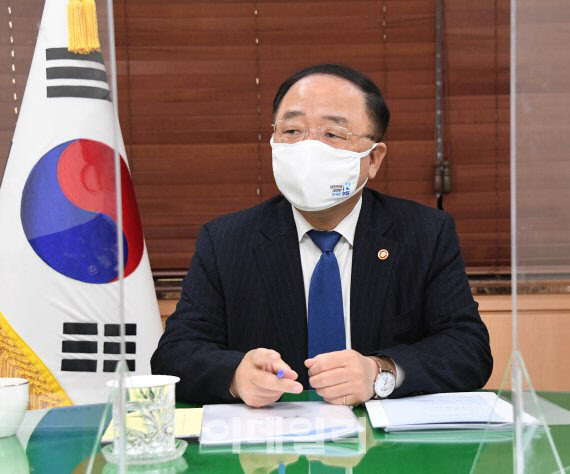 |
Finance Minister Hong Nam-ki holds a closed-door meeting with related ministers and high-ranking government officials to discuss how to resolve housing issues on Wednesday in Seoul. (MOEF) |
Amid growing concerns over the soaring cost of housing offered through “jeonse” contracts, Deputy Prime Minister Hong Nam-ki held a closed-door meeting with other ministers and high-ranking government officials Wednesday to discuss measures to address housing issues. Jeonse is a unique form of rental agreement in South Korea where tenants pay a refundable lump-sum deposit in lieu of monthly rent.
Among the participants were Minister of Land, Infrastructure and Transport Kim Hyun-mee, Chief of the Office for Government Policy Coordination Koo Yun-cheol, Financial Services Commission Chairman Eun Sung-soo and Senior Presidential Secretary for Economic Affairs Lee Ho-seung.
The details of the Wednesday meeting have not been disclosed as of press time. But the participants have reportedly gauged the rental market situation and discussed steps to supply quality rental housing to alleviate the public’s concerns.
The deputy prime minister, who also serves as the minister of economy and finance, has reportedly vowed swift efforts to cool down the heated housing market.
It was initially expected that the government would announce a plan to increase the supply of subsidized housing, but it halted the announcement at the last minute because the plan needed fine-tuning, according to reports.
At a meeting of the parliamentary finance committee last Friday, Hong said, “Implementing a range of measures, including ramping up the supply of rental houses, is a priority.” But the minister didn’t state a specific timeline.
Despite regulations adopted by the government in July to protect tenants and cap jeonse price hikes, long-term rental rates in Seoul have escalated in recent months. The average jeonse deposit rose 1.41 percent from August to October, much more than average property sale prices during the same period, which grew 0.21 percent.
Gangdong-gu, Songpa-gu and Gangnam-gu, relatively posh districts of the city, posted average increases of more than 2 percent in their jeonse prices.
A 97.35-square-meter apartment in Gangnam-gu, for instance, went for 1.6 billion won ($1.44 million) in late October, up 300 million to 550 million won from three months earlier.
What is more concerning is that the upward trend will likely continue through next year.
“The government is predicted to stick to the current expansionary fiscal and monetary policy due to the impact of the coronavirus crisis,” said Chung Kyu-chul, chief of the macroeconomic analysis and forecasting office at the Korea Development Institute think tank. “Considering high liquidity and low interest rates, the upward trajectory of house and rent prices will continue next year.”
By Kim Young-won (
wone0102@heraldcorp.com)








